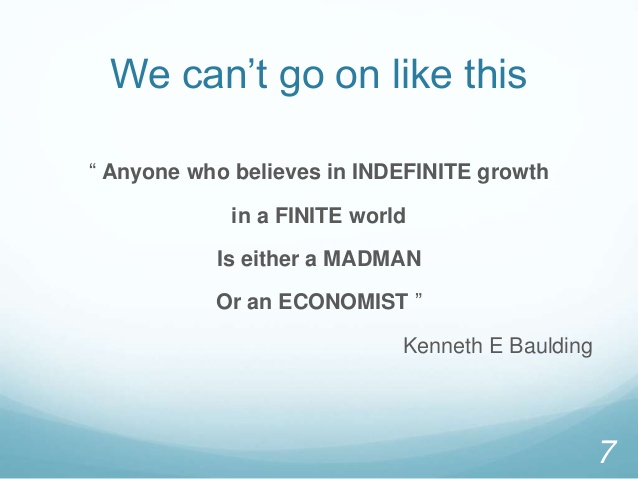
Photo:image.slidesharecdn.com
How economic growth has become anti-life
An obsession with growth has eclipsed our concern for sustainability, justice and human dignity. But people are not disposable – the value of life lies outside economic development
By Vandana Shiva

Vandana Shiva is a philosopher, environmental activist and author. She is one of the leaders and board members of the International Forum on Globalisation (Vandana Shiva - Wikipedia, the free encyclopedia)-Photo:cornucopia.org
“Limitless growth is the fantasy of economists, businesses and politicians. It is seen as a measure of progress. As a result, gross domestic product (GDP), which is supposed to measure the wealth of nations, has emerged as both the most powerful number and dominant concept in our times. However, economic growth hides the poverty it creates through the destruction of nature, which in turn leads to communities lacking the capacity to provide for themselves.
The concept of growth was put forward as a measure to mobilise resources during the second world war. GDP is based on creating an artificial and fictitious boundary, assuming that if you produce what you consume, you do not produce. In effect , “growth” measures the conversion of nature into cash, and commons into commodities.
Thus nature’s amazing cycles of renewal of water and nutrients are defined into nonproduction. The peasants of the world,who provide 72% of the food, do not produce; women who farm or do most of the housework do not fit this paradigm of growth either. A living forest does not contribute to growth, but when trees are cut down and sold as timber, we have growth. Healthy societies and communities do not contribute to growth, but disease creates growth through, for example, the sale of patented medicine.
Water available as a commons shared freely and protected by all provides for all. However, it does not create growth. But when Coca-Cola sets up a plant, mines the water and fills plastic bottles with it, the economy grows. But this growth is based on creating poverty – both for nature and local communities. Water extracted beyond nature’s capacity to renew and recharge creates a water famine. Women are forced to walk longer distances looking for drinking water. In the village of Plachimada in Kerala, when the walk for water became 10 kms, local tribal woman Mayilamma said enough is enough. We cannot walk further; the Coca-Cola plant must shut down. The movement that the women started eventually led to the closure of the plant”… Read the full article
Read more:
In Praise of the Economic Students at the Sorbonne: The Class of 2000
Towards an Education Worth Believing In
Small is Beautiful: The Wisdom of E.F. Schumacher
Economics and Economists Engulfed By Crises: What Do We Tell the Students?
